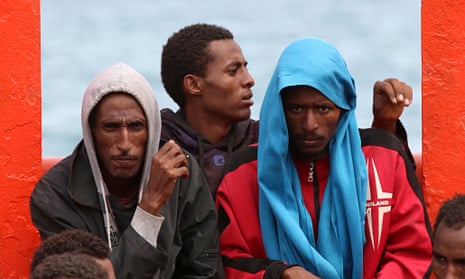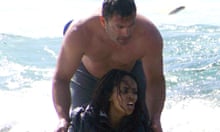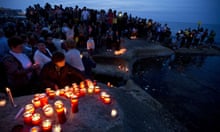One of the country’s most senior bishops has said that Britain has a moral imperative to accept refugees from conflicts in which it has participated.
After a week in which the death toll of migrants attempting to cross the Mediterranean into Europe grew to 1,700 so far this year, the bishop of Manchester, David Walker, said there was a duty to treat the survivors with compassion.
In a piece for the Observer published online, he writes: “They are pushed, not pulled, towards the EU, forced out of their homelands by war, terrorism and the persecution of minorities. A political rhetoric that characterises them as wilful criminals rather than helpless victims is as unworthy as it is untrue.”
The UK’s pivotal role in the 2003 invasion of Iraq prompted a sectarian war that the UN said had forced two million Iraqis to flee the country, an involvement that ran alongside the 13-year Afghanistan war and was followed by the 2011 attacks on Libya, both of which precipitated significant regional instability and migration.
According to the UN Refugee Agency in 2013, one in four refugees was Afghan, although most were in neighbouring countries, while the ongoing instability in Libya was credited with making the north African state a haven for people smugglers.
Walker writes: “The moral cost of our continual overseas interventions has to include accepting a fair share of the victims of the wars to which we have contributed as legitimate refugees in our own land.
“I want my country to be governed by those who are prepared to look at the faces of the desperate, be it the desperation of the asylum seeker or of the food bank client, and to look at them with compassion.”
He also criticised the language of mainstream parties on issues such as immigration and suggested that politics needed a new moral compass in the context of the growing number of deaths in the Mediterranean. “I want my political representatives to show they have values beyond expediency and appeal to the muddled middle. Only such politicians will I trust with the wellbeing of my family, my community and my nation.”
Despite the huge numbers of migrants heading north, only 5,000 resettlement places across Europe have been offered to refugees under an emergency summit crisis package agreed by EU leaders, with the rest sent back as irregular migrants under a new rapid-return programme coordinated by the EU’s border agency, Frontex.
“Welcome though it was that European leaders sat down to talk about the situation this week, their conclusions seem more directed at making the symptoms less visible than at tackling the disease,” said Walker.
Last year 170,000 migrants made it to Italy; as of 17 April this year, Italian authorities had registered 21,191 more. A 2014 report by the Global Initiative Against Transnational Organised Crime estimated that there might be 600,000 migrants on the north Africa coast who could try to get to Europe by sea.




Comments (…)
Sign in or create your Guardian account to join the discussion